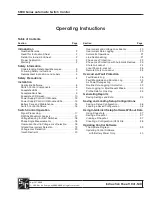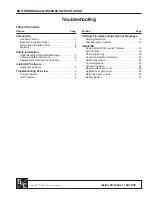
MS-2102
7.1
Chapter 7 Alarms
The measured ground fault current is greater than or equal to the Ground Fault
Alarm setpoint or, the ground fault current is greater than the maximum value
range.
ü
Check that the setpoint is appropriate for the length and type of cable.
ü
Check for wet or damaged heating cable, power connections, splices or tees.
ü
Test for correct ground fault measurement.
The measured ground fault current is greater than or equal to the Ground Fault
Trip setpoint.
ü
Check that the setpoint is appropriate for the length and type of cable.
ü
Check for wet or damaged heating cable, power connections, splices or tees.
ü
Test for correct ground fault measurement.
A memory or CPU failure has occurred.
ü
The Control Module needs repair.
Ground fault monitoring function did not detect the GF test current.
ü
Ground fault current transformer may be faulty.
ü
Ground fault monitoring function may be faulty and controller needs repair.
The heater current is greater than or equal to 0.1 A when the heater circuit is off.
ü
Check SCRs for failure in short circuit state.
ü
Controller may be faulty and needs repair.
The temperature derived from the RTD resistance has exceeded 500 °C or dropped
below -50°C
ü
Check for damaged RTD, cable or open/short connection.
ü
Check middle lead of RTD (terminal 7 or 11) for open connection.
ü
Pipe temperature has exceeded 500°C.
ü
Pipe temperature has dropped below -50°C.
ü
Test the RTD input.
Overview
The MS-2102 is capable of generating many different
types of alarms. In this chapter, alarms are organized in
three groups: trip or failure, heater and warning. Each
group represents a level of severity with the trip or failure
type being extremely critical, the process type requiring
some attention and warning type indicating those that do
not require immediate attention. Each group is detailed by
section throughout this chapter.
Access alarms by pressing [STATUS] where the total
number of alarms is displayed. You must review each
alarm by pressing [MESSAGE
ò
] several times, each
time displaying information about each alarm including
the alarm name and reason for the alarm.
Trip or Failure Alarms
GROUND FAULT
ALARM
GROUND FAULT
TRIP
SELF TEST
FAILURE ALARM
GF TEST
FAIL
RELAY FAILURE
ALARM
RTD FAILURE
ALARM














































